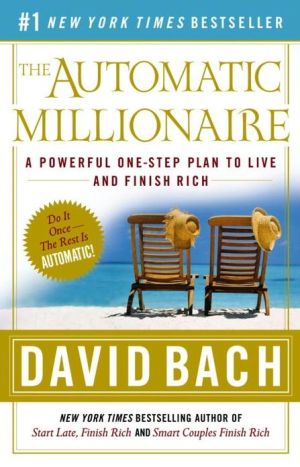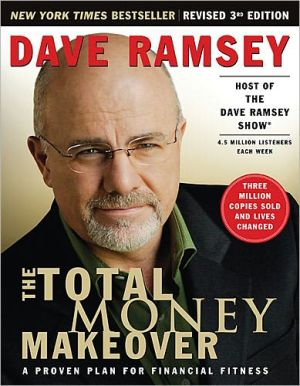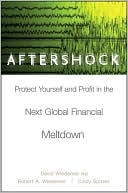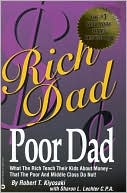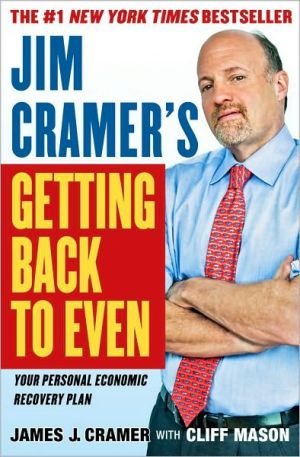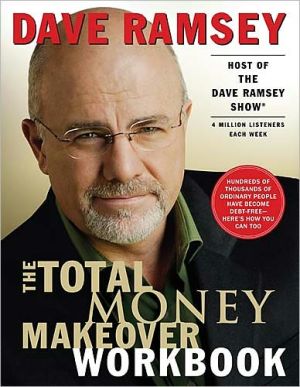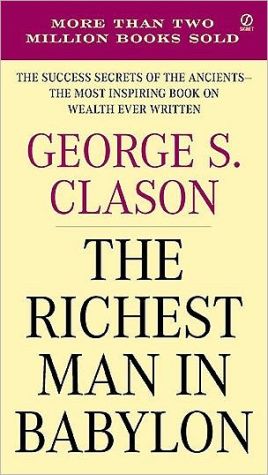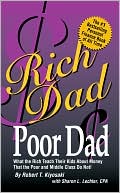The Automatic Millionaire: A Powerful One-Step Plan to Live and Finish Rich
What’s the secret to becoming a millionaire?\ For years people have asked David Bach, the national bestselling author of Smart Women Finish Rich, Smart Couples Finish Rich, and The Finish Rich Workbook, what’s the real secret to getting rich? What’s the one thing I need to do?\ Now, in The Automatic Millionaire, David Bach is sharing that secret.\ The Automatic Millionaire starts with the powerful story of an average American couple—he’s a low-level manager, she’s a beautician—whose joint...
Search in google:
What’s the secret to becoming a millionaire?For years people have asked David Bach, the national bestselling author of Smart Women Finish Rich, Smart Couples Finish Rich, and The Finish Rich Workbook, what’s the real secret to getting rich? What’s the one thing I need to do?Now, in The Automatic Millionaire, David Bach is sharing that secret.The Automatic Millionaire starts with the powerful story of an average American couple--he’s a low-level manager, she’s a beautician--whose joint income never exceeds $55,000 a year, yet who somehow manage to own two homes debt-free, put two kids through college, and retire at 55 with more than $1 million in savings. Through their story you’ll learn the surprising fact that you cannot get rich with a budget! You have to have a plan to pay yourself first that is totally automatic, a plan that will automatically secure your future and pay for your present.What makes The Automatic Millionaire unique:You don’t need a budget You don’t need willpower You don’t need to make a lot of money You don’t need to be that interested in money You can set up the plan in an hourDavid Bach gives you a totally realistic system, based on timeless principles, with everything you need to know, including phone numbers and websites, so you can put the secret to becoming an Automatic Millionaire in place from the comfort of your own home. This one little book has the power to secure your financial future. Do it once--the rest is automatic! Publishers Weekly Bach, author of several bestsellers including Smart Women Finish Rich and Smart Couples Finish Rich, offers a simple prescriptive plan for financial security. The secret: the astonishingly vanilla "Pay Yourself First," which, in Bach's words, is "the one proven, easy way to get rich." Instead of worrying about taxes, budgeting or investing, the key, according to Bach, is to set aside between 10% and 15% of gross income for savings the equivalent of one hour's worth of income every day. While this strategy may seem obvious, many people don't take this basic step. That's why Bach says everyone should write down their "Automatic Millionaire Promise," which spells out what percentage of their income they will start saving by a certain date. To insure that people carry through on their efforts, Bach says they should have deposits automatically made to a retirement account. Then, the next step is to capitalize on the power of compounding by contributing the maximum amount to, say, an employer's 401(k) account. To help readers navigate the maze of investment choices, Bach includes contact information for a number of mutual funds and Web sites offering authoritative financial information. Bach's key principle, along with such advice as buying real estate, paying down debt and making charitable deductions, is not groundbreaking; and regrettably, it may be unrealistic for many: tens of millions of Americans are in serious credit card debt because they can't make ends meet on their salaries; how, then, are they to save so much of their gross income? However, his easygoing approach, complete with real-life examples and clever phrases such as "Latte Factor," will appeal to the many money-challenged consumers who have made a New Year's resolution to get their finances on a firmer footing. (Dec.) Forecast: With a confirmed appearance on Oprah along with a television and radio satellite tour, and some 700,000 of Bach's other books in print, this one should hit some bestseller lists. Copyright 2003 Reed Business Information.
CHAPTER ONE\ \ MEETING THE AUTOMATIC MILLIONAIRE\ \ I'll never forget when I met my first Automatic Millionaire. I was in my mid-twenties and was teaching an investment class at a local adult-education program. Jim McIntyre, a middle-aged middle manager for a local utility company, was one of my students. He and I hadn't spoken much until one day when he came up after class to ask if he could make an appointment with me to review his and his wife's financial situation.\ \ The request surprised me. Though I felt strongly (and still do) that just about everyone can benefit from the advice of a qualified financial planner, Jim didn't strike me as the type who would seek it out.\ \ I told him I'd be happy to set up a meeting, but if he wanted my help, his wife would have to come too, as my group managed money only for couples who worked on their finances together.\ \ Jim smiled. "No problem," he said. "Sue's the reason I'm here. She took your Smart Women Finish Rich seminar and told me I should sign up for your course. I've liked what you've had to say, and we both figure it's time to do some financial planning. You see, I'm planning to retire next month."\ \ Now I was really surprised. I didn't say anything, but as I looked Jim up and down, I doubted he could be in a position to retire. From the few comments he had made in class, I knew he was in his early fifties and had worked for the same company for thirty years, never earning much more than $40,000 a year, and didn't believe in budgets. I also knew that he considered himself to be "ultraconservative," so I figured he couldn't have made a fortune in the stock market.\ \ My Grandma Rose Bach had taught me never to judge a book by its cover. But something didn't add up. Maybe Jim had just inherited a lot of money. For his sake, I hoped so.\ \ \ "WHAT AM I MISSING HERE?"\ \ \ When the McIntyres came into my office a few days later, they looked exactly like what they were: hardworking, "average Joe" Americans. What has stuck in my mind about Jim is that he was wearing a short-sleeved dress shirt with a plastic pocket protector in his breast pocket. His wife, Sue, had a little more flair, with some seriously blond highlights. She was a beautician, a couple of years younger than Jim.\ \ The thing was, they didn't act like middle-aged people. They were holding hands like two high school kids on a first date, bubbling with excitement. Before I could ask how I could help them, Jim started talking about his plans and what he would do with his free time. As he did, Sue kept exclaiming, "Isn't it great he can retire so young! Most people can't retire until they reach sixty-five if then, and here's Jim able to do it at fifty-two!"\ \ \ "LET'S NOT GET AHEAD OF OURSELVES."\ \ \ After ten minutes of this, I had to interrupt. "Guys, your enthusiasm is contagious, but let's not get ahead of ourselves here. I've met with literally hundreds of potential retirees over the last few years, and I have to tell you--hardly any of them have been able to retire in their early fifties." I looked Jim in the eye. "Usually people come to my office to find out if they can retire," I said. "You already seem to be sure you can. What makes you so certain you can afford to?"\ \ Jim and Sue exchanged a look. Then Jim turned back to me. "You don't think we're rich enough," he said, "do you?" The way Jim put it, it wasn't exactly a question.\ \ "Well, that's not the way I would have phrased it," I replied, "but yes, it takes a fair amount of money to fund an early retirement, and most people your age aren't even close to having saved enough. Knowing what I do about your background, I'm truthfully curious about how you could possibly have enough money." I looked him in the eye. He gazed back at me serenely.\ \ "Jim, you're only fifty-two." I said. "Considering that only about one in ten people can barely afford to retire at age sixty-five with a lifestyle equal to what they had when they worked, you have to admit that retiring at your age with your income would be a pretty big feat."\ \ Jim nodded. "Fair enough," he said and handed me a sheaf of documents. They included his and Sue's tax returns as well as financial statements that listed exactly what they owned and owed.\ \ I looked first at their tax returns. The previous year, Jim and Sue had earned a total of $53,946. Not bad. Not rich, to be sure, but a decent income.\ \ Okay, next. How much did they owe?\ \ I scanned their financial statements. I couldn't find any outstanding debts listed. "Hmm," I said, raising an eyebrow. "You have no debt?"\ \ \ "THE MCINTYRES DON'T DO DEBT."\ \ \ They exchanged another smile, and Sue squeezed Jim's hand. "The McIntyres don't do debt," she said with a chuckle.\ \ "What about your kids?" I asked.\ \ "What about them?" Jim answered. "They're both out of college, on their own, and God bless 'em."\ \ "Well, all right then," I said, "let's see what you own." I turned back to the financial statement. There were two homes listed: the house where they lived (valued at $450,000) and a rental property (a second house valued at $325,000).\ \ "Wow," I said. "Two houses and no mortgage on either?"\ \ "Nope," Jim replied. "No mortgage."\ \ Next came the retirement accounts. Jim's 401(k) balance currently amounted to $610,000. And there was more. Sue had two retirement accounts of her own that totaled $72,000. In addition, they owned $160,000 in municipal bonds and had $62,500 in cash in a bank savings account.\ \ Talk about a substantial asset base. Add in some personal property (including a boat and three cars--all fully paid for) and they had a net worth approaching $2 million!\ \ By any standard, the McIntyres were rich. It wasn't simply that they owned a lot of assets free and clear (though that in itself was pretty impressive); they also had a continuing stream of income in the form of interest and dividends from their investments and $26,000 a year in rent generated by their second house. On top of that, Jim had qualified for a small pension, and Sue liked being a beautician so much that she planned to keep working until she was sixty (even though she didn't need to). Suddenly, Jim's plan to retire at fifty-two didn't seem so crazy. In fact, it was completely realistic. More than realistic--it was exciting!\ \ \ "WE INHERITED KNOWLEDGE."\ \ \ Normally, I don't get wide-eyed about people's wealth. But there was something about the McIntyres that impressed me. They didn't look rich. And they didn't seem terribly special. To the contrary, they seemed perfectly ordinary--your average, nice, hardworking couple. How could they have possibly amassed such wealth at such a relatively young age?\ \ To put it mildly, I was confused. But I was also hooked. I was in my mid-twenties at the time, and even though I was making good money, I was still basically living paycheck to paycheck. Some months I did manage to save a little, but more often than not I'd get busy or spend too much the next month and not save a dime. Many months it seemed that instead of getting ahead, I was falling behind, working harder and harder to make ends meet.\ \ It was embarrassing, really, and frustrating. Here I was, a financial advisor teaching others how to invest, and I was often struggling myself. Even worse, here were the McIntyres, who probably in their best year barely made half of what I was making, and yet they were millionaires, while I was falling further and further into debt.\ \ Clearly, they knew something about taking action with their money that I needed to learn. And I was determined to find out what it was. How could such regular people have amassed such wealth? Eager to know their secret but not knowing where to begin, I finally asked them, "Did you inherit any of this?"\ \ Jim broke out in a deep belly laugh. "Inherit?" he repeated, shaking his head. "The only thing we inherited was knowledge. Our parents taught us a few commonsense rules about handling money. We just did what they said, and sure enough it worked. The same is true for a lot of people we know. In fact, in our neighborhood, about half our friends are going to retire this year, and many of them are even better off then we are."\ \ At this point, I was hooked. The McIntyres had come to interview me about how I could help them, but now I wanted to interview them.\ \ \ LOOKING RICH VS. BEING RICH\ \ \ "You know," I said, "every week I meet people who take my classes like you did but who are exactly the opposite of you. I mean, they look rich, but when you get into the details of what they really have, it often turns out that they are not only not rich but broke. Just this morning, I met with a man who drove up in a brand-new Porsche, wearing a gold Rolex watch. He looked loaded, but when I went through his statements I found he was actually leveraged to the hilt. A guy in his mid-fifties, living in a million-dollar home with an $800,000 mortgage. Less than $100,000 in savings, more than $75,000 in credit card debt, and he was leasing the Porsche! Plus he was paying alimony to two ex-wives."\ \ At this point, the three of us couldn't help ourselves. We all began to laugh. "I know it's not funny," I said, "but here was this guy, looking rich and successful, and actually he's a financial and emotional wreck. He handled his finances just like he drove his Porsche: redlining all the way. Then you guys come in. You drive up in a Ford Taurus. Jim here is wearing a ten-year-old Timex--"\ \ "Nope," Jim interrupted with a smile. "It's an eighteen-year-old Timex."\ \ "Exactly!" I said. "An eighteen-year-old Timex. And you're rich. You guys are happy as clams, still married, two great kids you put through college, and you're retiring in your mid-fifties. So please tell me--what was your secret? You must have one, right?"\ \ Sue looked me straight in the eye. "You really want to know?" she asked.\ \ I nodded wordlessly. Sue looked at Jim. "You think we can spare an extra fifteen minutes to explain it to him?"\ \ "Sure," Jim said. "What's fifteen minutes?" He turned to me. "You know, David, you already know this stuff. You teach it every day. We just lived it."\ Excerpted from The Automatic Millionaire by David Bach Copyright© 2003 by David Bach. Excerpted by permission of Broadway, a division of Random House, Inc. All rights reserved. No part of this excerpt may be reproduced or reprinted without permission in writing from the publisher.
IntroductionChapter One: Meeting the Automatic MillionaireChapter Two: The Latte Factor: Becoming an Automatic Millionaire on Just a Few Dollars a DayChapter Three: Learn to Pay Yourself FirstChapter Four: Now Make it AutomaticChapter Five: Automate for a Rainy DayChapter Six: Automatic Debt-Free Home OwnershipChapter Seven: The Automatic Debt-Free LifestyleChapter Eight: Make a Difference with Automatic TithingA Final Word: Your Journey Begins Today!AcknowledgmentsIndex
\ Publishers WeeklyBach, author of several bestsellers including Smart Women Finish Rich and Smart Couples Finish Rich, offers a simple prescriptive plan for financial security. The secret: the astonishingly vanilla "Pay Yourself First," which, in Bach's words, is "the one proven, easy way to get rich." Instead of worrying about taxes, budgeting or investing, the key, according to Bach, is to set aside between 10% and 15% of gross income for savings the equivalent of one hour's worth of income every day. While this strategy may seem obvious, many people don't take this basic step. That's why Bach says everyone should write down their "Automatic Millionaire Promise," which spells out what percentage of their income they will start saving by a certain date. To insure that people carry through on their efforts, Bach says they should have deposits automatically made to a retirement account. Then, the next step is to capitalize on the power of compounding by contributing the maximum amount to, say, an employer's 401(k) account. To help readers navigate the maze of investment choices, Bach includes contact information for a number of mutual funds and Web sites offering authoritative financial information. Bach's key principle, along with such advice as buying real estate, paying down debt and making charitable deductions, is not groundbreaking; and regrettably, it may be unrealistic for many: tens of millions of Americans are in serious credit card debt because they can't make ends meet on their salaries; how, then, are they to save so much of their gross income? However, his easygoing approach, complete with real-life examples and clever phrases such as "Latte Factor," will appeal to the many money-challenged consumers who have made a New Year's resolution to get their finances on a firmer footing. (Dec.) Forecast: With a confirmed appearance on Oprah along with a television and radio satellite tour, and some 700,000 of Bach's other books in print, this one should hit some bestseller lists. Copyright 2003 Reed Business Information.\ \ \ \ \ Library JournalBach (Smart Couples Finish Rich) takes a unique approach to the financial wealth-building genre by shaping his many tips and techniques around an average American couple with a joint annual income of under $55,000 who manage to own two homes debt-free, put two kids through college, and retire at 55 with more than $1 million in savings. The sound advice covers well-known principles of eschewing credit cards and the importance of establishing and keeping to a plan to pay yourself first that is totally automatic, a plan that will secure your future and pay for your present. The author's lively narration keeps the listener's interest in these facts about how money works and how not to spend every dollar you earn. Highly recommended for all public libraries.-Dale Farris, Groves, TX Copyright 2004 Reed Business Information.\ \
